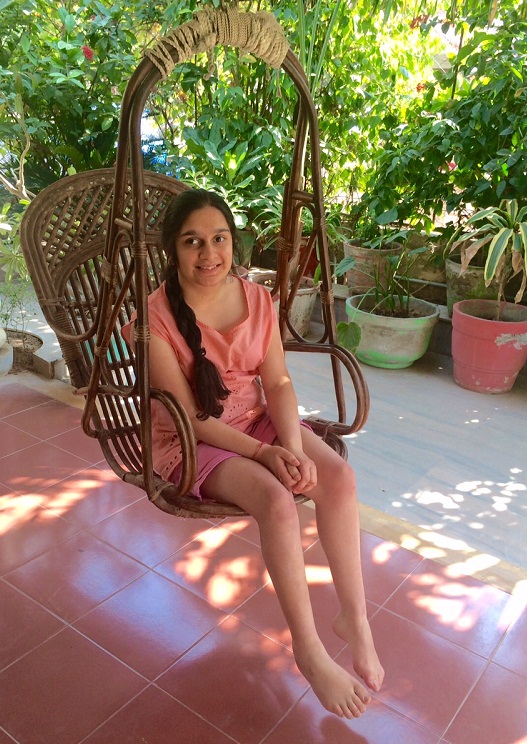
“No one can stop you if you have a strong desire to do something.” Muskan Devta urges her audience to dream at last year’s TED talks in Auckland.
Those who haven’t met 15-year-old Muskan Devta could be forgiven for thinking of her as just another carefree teenager, swinging happily in a cane chair on the verandah of a typical suburban house in Gujarat, India.
The first thing to strike you is her sunny disposition. But then it is her squint and then, as she takes your hand and leads you inside, her limp.

Muskan makes no fuss of her constant struggle with hemiplegia, a condition characterised by paralysis of one side of the body. Born with holes in her heart, underdeveloped lungs and the potential for multiple neurological problems, the first several years of her childhood were spent living on the edge. A 13-year wait just to be able to wear normal shoes and years of punishing physiotherapy epitomise her ordeal.
“Hi, come on in; you are here to talk to me; can I get you some water?” asks Muskan in one breath, as she climbs the stairs to fetch her mother.
The girl, who New Zealanders say has become a household name in her adopted country, is visiting her grandparents on holiday. Typically, to make the most of her trip, she has raised 58,000 rupees ($A1000) to support an Indian school for the blind that she had once visited.
But the debilitating hemiplegia is just a part of Muskan’s story, which is actually one of resilience and courage, and which started when her parents took her to New Zealand 11 years ago in search of treatment and a better life.
Over that time, she has become an author and a motivational public speaker, featuring in the popular TED talks, winning multiple awards and emerging as a role model for her peers at a school where she had initially felt an outcast because of her disabilities.
Muskan wrote her first book at age nine after learning that the centre in Auckland where she was receiving physiotherapy needed an exercise bike. The book, about the Hindu God of wisdom, Ganesha, raised funds for the bike and was included in the Ministry of Education’s 2010 journal that was distributed to all New Zealand schools and which led to further accolades, including a “most effective citizen” award in 2008.
“We have always tried to make her see beyond her disability . . . [I]t’s not just all about the things that she can’t do. It’s really also about the things that she can do and to make the most of that.” — physiotherapist Jo Walker
Her physiotherapist of more than 10 years, Jo Walker, says the success of the book played a critical role in Muskan’s transformation “from a shy, quiet, introverted child to this amazingly confident, outgoing, dynamic young woman”.
“We have always tried to make her see beyond her disability . . . make her realise that there is a big world she is a part of and that it’s not just all about the things that she can’t do. It’s really also about the things that she can do and to make the most of that.”
Muskan arrived into the world prematurely after a complicated birth, weighing just 1.2 kilograms. The doctors in Ahmedabad, the most developed city in Gujarat state, could not assure her family that Muskan would survive. Admitted to intensive care, her prognosis was bleak.
“It was a wait and watch game,” says her mother, Jaimini Devta, a former microbiologist and freelance journalist. “I was so scared [and fearing] the unknown that I wouldn’t sleep next to Muskan for the first few months thinking that something would happen to her.”
Instead, the child’s grandparents took it upon themselves to ensure Muskan’s survival. Long nights, massages and feeding her milk drop-by-drop consumed their lives, while Muskan’s grandfather left his job to become her full-time carer.
“We used to be so cautious for her to not fall sick,” says her grandmother, Subasini Devta. “We would burn wood logs around her room to keep the house warm. She wouldn’t take milk. Her reflexes and muscles were poor. She would put on, like, 100 grams in two weeks.”

Periodically, there were setbacks. Her grandmother first noticed her limb weakness when Muskan started to walk. The toddler had also developed a noticeable squint. The pediatrician diagnosed her with multiple neurological deficits leading to severe muscle weakness in parts of her body, including paralysis of one leg. A journalist colleague then advised Jaimini and her husband, Arun, to move to Australia or New Zealand in a bid to access better medical facilities.
The move was not easy for the family, least of all Muskan, who presented to her new medical carers with “visual problems that obviously affected her learning and fine motor ability, difficulty with bilateral co-ordination . . . difficulty with trunk strength and stability . . . weakness of other muscles and she had to wear a splint on her leg,” according to Ms Walker.
Says Muskan: “I remember going to the school and hating it because no one wanted to play with me, be my friend. Recess time was the hardest. I would roam around alone and limping, ending up in the library.
“I used to read and read. Initially, I thought the teachers are good to me because of my limp. But slowly I realised that, no, they are treating me like a normal person and support me because of my merit.”
One particularly painful incident arose when Muskan, aged nine, was denied swimming lessons at the local pool in Auckland, being told flatly by the instructor that she would never be able to swim.
She recalls crying and sitting by the edge of the pool, her legs dangling in a Dora swimsuit.
Her mother had drawn an imaginary circle on Muskan’s thigh with a dot in its centre, saying that the circle represented the whole world and the dot the child’s brain.
“Who is more powerful?” she had asked.
“The whole world,” replied Muskan.
Ms Devta remembers telling her daughter: “No. Your brain is more powerful than the whole world. If you decide upon something, then nothing can ever stop you.”
“I used to talk about issues that would appeal to kids and youth – bullying, self-esteem, and road safety, global warming, studying for exams, and Bollywood gossip! — Muskan Devta, about her radio chat show
Ms Devta says it was because of Muskan’s persistence that she is now swimming at an advanced level at the same pool.
But Muskan has made achieving against all odds a habit. At 12, she was hosting her own radio program at a local Hindi station, Radio Tarana, the youngest radio host in New Zealand with 59,000 listeners tuning in weekly to “Muskan and You”.
“They called me because I am peppy,” she says proudly. “I used to talk about issues that would appeal to kids and youth – bullying, self-esteem, and road safety, global warming, studying for exams, and Bollywood gossip! My favourite section was birthday messages: people would send messages and I would love putting my twist on it.”
Around the same time, Muskan also wrote her first by-lined story for a local newspaper and last year won the Best Attitude accolade in the junior category of New Zealand’s disability awards. She was also the youngest individual to be nominated for the national Pride of New Zealand award, a feat repeated again this year, on top of her 2015 Youth Week Award.
Of the Pride nomination, Ms Devta says: “She didn’t win, but it’s not about that or material achievement, but about recognition. The more people who know her story, and relate to it, the more rewarding for us. We want to inspire those people with her resilience. I am her mother, but I still learn so much from her.”

Her mother’s acclamation brings a smile to Muskan’s face as she playfully kicks the swing on the porch of her grandparent’s home in India.
“I am two-faced. You know that Ma!” she chortles. “If I have decided to do something I will make sure I do it, but if I don’t want to do something then the whole world can turn upside down, and I won’t do it.”
Aman, her nine-year-old brother, interjects: “That’s normal teen stuff.”
The pair share a special bond, says Ms Devta.
“Aman was a turning point for Muskan. He doesn’t see himself neglected because of all the attention she gets. He just gives his too.”
Adds Aman: “Oh yeah, we are very awesome. She can speak to 1000 people, and I can speak to one.”
Amid the banter it is easy to dismiss the long years of effort that have preceded this moment. Muskan had to wait 13 years for her leg to grow sufficiently to be able to have corrective surgery.
“My muscles were weak. I couldn’t participate in sport. I would think people would laugh at me. No one wanted me in his or her team. I was called ‘slow’. And I was looked at as a different species. I hated PE. But now the braces are gone, and I can manage.”
Adds her mother: “Muskan was never able to wear normal shoes because of her braces. After the surgery, when her brace was removed, all she wanted to do was go to the mall and buy shoes . . . We ended up buying three pairs.”
But the long wait coincided with months of arduous physiotherapy that continued while she battled post-surgical pain.

“I think at the beginning it was really hard, especially for a child,” says Muskan’s physiotherapist, Ms Walker. “But she sort of matured and got a better understanding, taking a better responsibility of that for herself. And it has a big effect on fatigue because everything is much, much harder and takes a lot more effort so that plays a huge factor for children particularly.”
After the surgery Muskan decided to write a second book, an autobiography, with the aim of inspiring other children with disabilities. Proceeds of $2500 have been donated to Auckland’s Starship Hospital where Muskan had surgery, with half the 1000 published copies so far sold.
The book, I Dream, has been added to the English curriculum for Year 9 students at Westlake Girls school, in Auckland, in a unit titled ‘courage’.
Muskan, meanwhile, dreams of being an ambassador for young people with special needs in New Zealand and will be a guest speaker at September’s Festival for the Future and Zeal Tall Poppy, which showcase young innovators and influencers from across the world.
But already, she has made her mark, perhaps aptly conveyed by lines drawn from her book.
“You want something in life? Go get it. No one can stop you if you have a strong desire to do something. Achieve, dream and achieve some more!
So now I ask you: what do you want from life?”
► An edited version of this story was also published by New Zealand’s Sunday Star Times.

